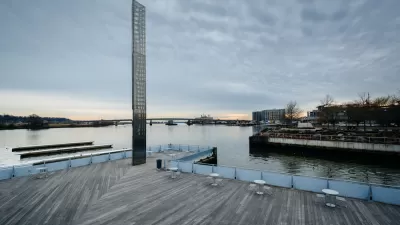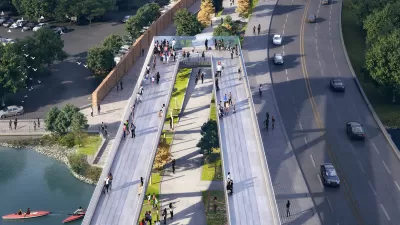The Washington, D.C. region has accomplished a major environmental victory, cleaning up the Anacostia River enough for humans to swim in for the first time in five decades.

On July 8, swimmers will enter the water of the Anacostia River legally and safely for the first time in 50 years for an event called Splash, organized by the nonprofit Anacostia Riverkeeper. While the river isn’t fully open to the public for swimming yet, the occasion is a major milestone on a decades-long effort to clean up the river by removing sewage and other pollutants from the watershed.
“Water entry became illegal in 1971 after water quality safety concerns were attributed to sewage overflow, organizers said. Since then, local advocacy groups have worked to restore the cleanup of the river,” reports Jonathan Taylor in a news article announcing the historic event and accomplishment. “In the 50 years, Anacostia Riverkeeper said the sewage bacteria has decreased by 80% in key recreation sites.”
Swimming is still illegal in the rest of the river and the rest of the year, but the Splash event could be another step toward the goal of completely reopening the river to swimmers. The U.S. Army Corps of Engineers in December 2022 launched a study into whether the conditions of the Potomac River, and its tributary the Anacostia, allow for safe swimming.
Additional coverage of the Splash event is available from WUSA.
Previous Planetizen coverage of the Anacostia River cleanup effort:
FULL STORY: Dive into history! Anacostia River opens for swimming after 50 years of cleanup efforts

Study: Maui’s Plan to Convert Vacation Rentals to Long-Term Housing Could Cause Nearly $1 Billion Economic Loss
The plan would reduce visitor accommodation by 25,% resulting in 1,900 jobs lost.

Placekeeping: Setting a New Precedent for City Planners
How a preservation-based approach to redevelopment and urban design can prevent displacement and honor legacy communities.

Using Old Oil and Gas Wells for Green Energy Storage
Penn State researchers have found that repurposing abandoned oil and gas wells for geothermal-assisted compressed-air energy storage can boost efficiency, reduce environmental risks, and support clean energy and job transitions.

Washington State Plans Ambitious ‘Cycle Highway’ Network
The state is directing funding to close gaps in its existing bike network and make long-distance trips more accessible.

Homeowners Blame PG&E for Delays in ADU Permits
The utility says it has dramatically reduced its backlog, but applicants say they still face months-long delays for approvals for new electrical work.

Rethinking Wildfire Defense: How a Landscape Approach Can Protect Neighborhoods
Post-fire analysis of the Eaton Fire reveals that a landscape approach — including fire-resistant vegetation, home hardening, and strategic planning — can help reduce wildfire risk, challenging assumptions that trees and plants are primary fire hazards.
Urban Design for Planners 1: Software Tools
This six-course series explores essential urban design concepts using open source software and equips planners with the tools they need to participate fully in the urban design process.
Planning for Universal Design
Learn the tools for implementing Universal Design in planning regulations.
Borough of Carlisle
Caltrans
Heyer Gruel & Associates PA
Institute for Housing and Urban Development Studies (IHS)
City of Grandview
Harvard GSD Executive Education
Salt Lake City
NYU Wagner Graduate School of Public Service
City of Cambridge, Maryland




























